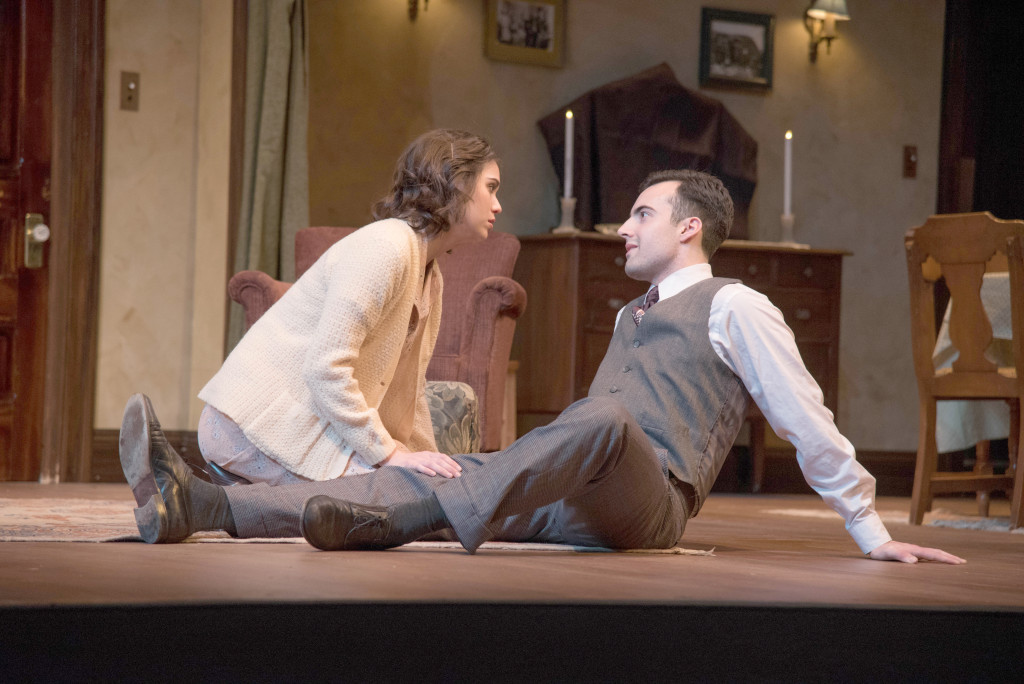Finding Hope During the Great Depression
Awake and Sing! examines the American dream
Riley O'ConnellTHE SANTA CLARANovember 12, 2015
[dropcap]I[/dropcap]ncome inequality is at a higher level now than during the Great Depression. So during Santa Clara’s production of Clifford Odet’s 1935 play, “Awake and Sing!,” audiences can find striking similarities between themselves and a struggling three-generation Jewish American family in the 1930s Bronx.
After working nearly 100 shows at the Oregon Shakespeare Festival in Ashland, guest director Scott Kaiser oversaw the wildly emotional play. According to him, it’s a “loving homage to the Ashkenazi Jews that fled the pogroms (ethnic massacres) of Europe, settled in the United States and scratched their way out of poverty over many generations.”
Though Kaiser has loved, performed and directed Shakespeare since the age of 15, he jumped at the chance to direct Santa Clara’s fall play, which runs nightly at 8 p.m. through Saturday in the Louis B. Mayer Theatre. Kaiser saw the relatively more modern piece as an opportunity both to explore his own heritage and to “teach a master class in acting” in a university setting.
“I (love) watching my actors’ work deepen in front of an audience,” Kaiser said.
And deepen, it did. Over the course of two hours, the audience delved into the insurmountable tension between Bessie Berger (played by senior Maura Bonini) and her husband Myron, father Jacob and children Hennie and Ralph.
All characters, but especially the kids, lie in wait throughout the play to break free from their stifled, poor existence. Fiercely intelligent and disobedient, the youngest Bergers fight for their right to happiness.
Ralph refuses a life governed by materialism, but his mother, a lower-class woman living in the midst of the Great Depression, knows and stresses the importance of wealth.
“The themes and questions this play poses are still relevant,” said senior Tabitha Petrini, who plays Hennie. “The tension between immigration and assimilation, capitalism and communism, and responsibilities versus freedom are all issues our society still grapples with.”

The two siblings each seek their solace in romance. Ralph finds it with his penniless lover, Blanche. But Hennie vacillates between her immigrant husband Sam, who came into her life to cover up her out-of-wedlock pregnancy with a random man, and tough guy, family friend and amputee, Moe Axelrod, with whom she shares an impossible-to-deny chemistry.
While the siblings are prideful and aware of their personal motivations, both maintain their love of family throughout. Yet they don’t make it clear whether this is out of obligation or choice.
Regardless, the play inspires sympathy for the family as the audience identifies with the emotions they dig up. Drew Descourouez, the first-year behind Ralph Berger, said his hope for the show was to have the audience wrestle with emotional and mental quandaries that may not have occurred to them naturally.
“It’s an ambitious goal, but I think the true aim of any art is to make us all feel, think and live, deeply, truly and freely,” Descourouez said. “I find it so exciting to be given the chance to use art to bring life to certain ideas, to be responsible advocates for those ideas.”
Petrini wants the audience to avoid judging the characters, and instead seek to understand their nuanced motivations. The strong wills of mother and daughter clash as they each pursue their own noble goals.
“Hennie is an independent woman living in a constraining family,” Petrini said. “It’s the thirties, and social constraints and familial obligations affect her more significantly than they would in modern society. And it’s not that Hennie is good and Bessie (her mother) is bad for imposing these social norms. It was just a complex time and Hennie got into a bad situation. Her mom is trying to keep the family together and Hennie is trying to live her own life.”
“Awake and Sing!” is a classic story of the American Dream. It details the hurdles we must overcome to realize our hopes. The characters grapple with a swarm of conflicting responsibilities and longings in a quest to achieve the elusive goal of lasting happiness. It’s a relatable tale for any citizen of this country, as we can find slivers of ourselves in this hardscrabble family.
“It’s a very human show,” Descourouez said. “I hope people are willing to apply themselves, willing to imagine themselves somewhere onstage, as someone in this family.”
Contact Riley O’Connell at roconnell@scu.edu.